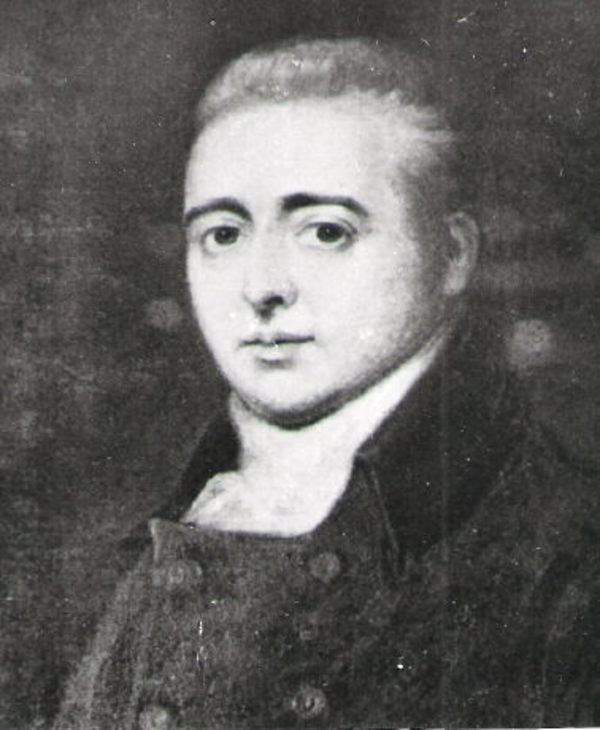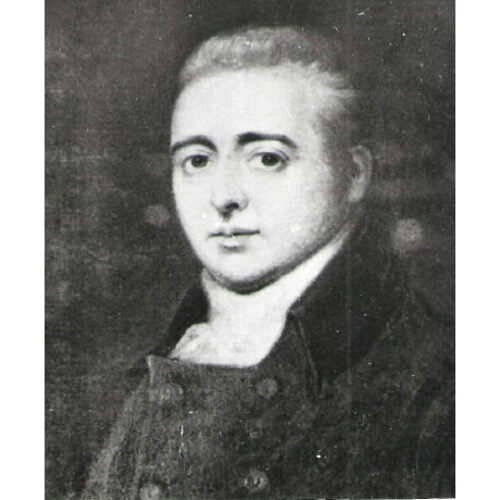
Source: Link
ROUTH, RICHARD, office holder and judge; b. c. 1749 in Bristol, England; m. 3 July 1771 Abigail Eppes, daughter of William Eppes of Salem, Mass., and they had seven children, including Randolph Isham*; d. 1801 at sea.
Richard Routh would have been instantly identified by Charles Dickens as being of that classical genus, the inveterate place seeker. He knew little of the revenue service, but moved from the obscurity of his civilian life to the senior customs position in Newfoundland; he knew even less about law, but became chief justice of the island.
Routh emigrated from Bristol to Salem at the age of 17 and became a storekeeper there. For seven years he also acted as deputy collector of customs at Salem and Marblehead. On the eve of the American revolution, Routh, a loyalist, was among a group of prominent Salem residents who presented a congratulatory note to the former governor of Montreal, Thomas Gage*, on his appointment as governor of Massachusetts in 1774. Four months later Routh’s house and property were set on fire by unknown enemies. He took part in the evacuation of Boston in March 1776, and at New York that summer he joined the Associated Loyalists of Massachusetts for the defence of the city. In October 1778 he and his family left for England.
Although Routh was without employment, he was not without influence. Probably through his father-in-law, he was placed in touch with the wealthiest merchant in the Newfoundland trade, Benjamin Lester of Poole, Dorset. Routh’s name began to appear in Lester’s diary in 1779, and soon after he went to Poole, where he acted as a senior clerk or manager for some of Lester’s business affairs. However, by 1782 Lester’s son-in-law George Garland had joined the firm, and this event ended Routh’s prospects for advancement. He then apparently purchased a vessel and prepared to go into business on his own account. Events in Newfoundland rendered this step unnecessary when the position of collector of customs was declared vacant. It had been untenanted since 1777, but the American war had preoccupied the government and no one in Newfoundland was anxious to remind it that there was no longer a custom-house on the island. Lester had substantial political influence and managed to obtain the post of collector of customs for Routh in 1781 and that of controller of customs for D’Ewes Coke, a surgeon at Lester’s main fishery in Trinity Bay, in 1785.
Routh sailed to Newfoundland in 1782 and returned to Poole on the very day that the merchants met and decided to support those of Dartmouth, Devon, in a campaign to have the custom-house in Newfoundland abolished. This campaign had nothing to do with him personally and had been going on since 1764, the year in which the commissioners of the customs had first decided that Newfoundland, like the mainland possessions, ought to have a custom-house. Routh reacted quickly to the news that the merchants had voted to abolish his job and spent the end of December 1782 currying favour with as many of them as he could find. At the same time Lester exerted his own much more powerful influence, and very soon another meeting of the merchants was held, at which the resolution “was dropp’d and [it was] agreed that Mr. Routh would [do] everything in his power to lessen the grievances they complain’d of and put the fees on a more equitable plan.” This reversal placed a wedge between the merchants of Poole and those of Dartmouth and Bristol, who continued to press for the abolition of the custom-house. The division was, however, explicable in wider terms than the influence of Lester or the modest and placatory demeanour of Routh. The Dartmouth and Bristol merchants had their major interests in St John’s and were thus under the direct eye of the customs officials. Only one of the Poole firms was established there, the rest trading to the outports, where the customs officials were all either agents, doctors, or clergymen under the merchants’ influence.
In 1786 the government confirmed the necessity of the custom-house. Routh, although now secure, would meet with hostility from St John’s traders almost to the end of his life, but it was muted and generally passive, owing in part to his own discretion in exercising power. The position of collector of customs in Newfoundland carried no fixed salary, and Routh depended upon a share of the fees levied on shipping and cargoes. The job had one supreme attraction, however: the collector, unlike his deputy the controller, was not obliged to reside permanently on the island. Newfoundland’s shipping season was confined to the April–December period, and for most of that time the controller could handle all the duties – it was necessary for Routh to be present only at the end of the fishing season. Routh exploited this situation to the full. He never left England until June, sometimes delayed sailing until August, and could be sure of returning to Britain by the end of December. His family was settled in Poole, and his winters were agreeably taken up by dinners, and in trips from Poole into the country, to Bath for “the waters,” and up to London, while the rigours of life in Newfoundland were softened by the employment of a maid and the importation of what appears to have been the first coach. His life of pleasant and dignified routine was enlivened only by the dangers of the sea and by a temporary revival of mercantile antagonism to the custom-house between 1790 and 1793. He continued to win the support of previously hostile merchants, obtained the confidence of the government and a succession of naval governors, and retained the warm regard of Benjamin Lester.
In 1798 an unexpected event propelled Routh to the apex of his career when D’Ewes Coke, now chief justice of Newfoundland, was forced to resign. After the departure of John Reeves* in 1792 it had proved impossible to persuade anyone with the slightest legal training to replace him as chief justice, and in the absence of any qualified candidates Coke obtained the job. Although he was not originally required to reside permanently in Newfoundland, in 1798 Governor William Waldegrave* prevailed upon the government to order this condition. Coke pleaded ill health and resigned, and strenuous lobbying by the Poole merchants resulted in Routh’s appointment; through some oversight he continued to act as the collector of customs as well. The last three years of his life were, however, increasingly unpleasant. He was no more willing than Coke to spend any winters in Newfoundland, and to everyone’s consternation he appeared back in England at the end of the year, explaining that he had come for his family. An angry government ordered him to return by the first warship, which sailed in March; Routh replied with a doctor’s certificate to the effect that a serious attack of gout made a journey to Newfoundland most inadvisable.
Routh finally sailed, without his family, in July 1799, and again determined to return home at the end of the year. He waited until Waldegrave had sailed for England and thus had to take passage on a Dartmouth fishing brig. This vessel was taken in January 1800 by a French privateer, and for two months Routh underwent an expensive and exhausting captivity. He disconsolately returned to Newfoundland the same year, spent two or three months on the island, and sailed for England in December on the frigate Camilla. A heavy gale threw her on her beam ends and, according to Routh, forced him under water for five minutes, greatly aggravating his gout and doing nothing to improve his now bitter relationship with his superiors. By this time Routh must have regretted his decision to commute between England and Newfoundland, but the needs of his family drove him on. In the fall of 1801 Routh was aboard the sloop Fly when it disappeared somewhere in the North Atlantic. By December his friends became alarmed. Six months later the government received a letter from Jonathan Ogden, chief surrogate judge in St John’s, which with careful sympathy reminded the government that Routh must now be presumed dead, outlined the need for a new chief justice, and recommended himself for the post.
Thus ended the life of Richard Routh. What had he done to affect the world? One is forced to conclude that he had affected it very little. However, he had managed to maintain his wife and to rear his children to maturity. His connection with Lester outlasted both their lives, for most of his sons became merchants, some almost certainly through the influence of Lester’s heirs.
Dorset Record Office, D365/F2–F10; P227/RE3–RE10 (Reg. of marriages, 1770–86). Hunt, Roope & Co. (London), Robert Newman & Co., letterbooks, 1800. PANL, GN 2/1, 1783–1801. PRO, BT 1/2; BT 5/5, 5/9; CO 194/21–43; CO 325/5. G.B., House of Commons, “Reports from the committee on the state of the trade to Newfoundland, severally reported in March, April, & June, 1793” in Reports from committees of the House of Commons which have been printed by order of the House and are not inserted in the Journals, [1715–1801] (16v., London, [1803–20]), 10: 391–503. Jones, Loyalists of Mass. Stark, Loyalists of Mass. (1910).
Bibliography for the revised version:
National Arch. (London), AO 13/92 (American loyalists claims, ser.1, subser. new evidence), ff.408–10. Essex Gazette (Salem, Mass.), 14 June 1774. Essex Journal (Newburyport, Mass.), 12 Oct. 1774. Salem Gazette, 4 June 1802. Rif Winfield, British warships of the age of sail, 1792–1815: design, construction, careers and fates (London, 2005).
Cite This Article
K. Matthews, “ROUTH, RICHARD,” in Dictionary of Canadian Biography, vol. 5, University of Toronto/Université Laval, 2003–, accessed December 31, 2025, https://www.biographi.ca/en/bio/routh_richard_5E.html.
The citation above shows the format for footnotes and endnotes according to the Chicago manual of style (16th edition). Information to be used in other citation formats:
| Permalink: | https://www.biographi.ca/en/bio/routh_richard_5E.html |
| Author of Article: | K. Matthews |
| Title of Article: | ROUTH, RICHARD |
| Publication Name: | Dictionary of Canadian Biography, vol. 5 |
| Publisher: | University of Toronto/Université Laval |
| Year of publication: | 1983 |
| Year of revision: | 2023 |
| Access Date: | December 31, 2025 |



